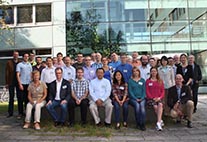Workshop: International Researchers Investigate Measurement Errors in Sea Ice Models
23 September 2014, by Markus Dressel

Photo: UHH/CEN/A.Woznica
On September 18 and 19, a workshop on the Analysis and Optimization of Sea Ice Data was held at Bundesstraße 55 (formerly the ZMAW building) ...
On September 18 and 19, a workshop on the Analysis and Optimization of Sea Ice Data was held at Bundesstraße 55 (formerly the ZMAW building). 55 researchers from around the globe accepted the invitation from Dr. Stefan Kern, a climatologist at CliSAP and the event’s organizer. Together they investigated the nature of measurement inaccuracies found in a European Space Agency (ESA) project on the area and thickness of polar ice and discussed how they could be reduced.
The researchers, who hail from Canada, the USA, Great Britain, France, Finland and Norway, largely agree on at least one thing: sea ice is shrinking in the Arctic, while the sea ice coverage is expanding in the Antarctic. However, the data currently available on the polar regions, which has been collected since the 1990s by e.g. the ESA’s SICCI Project (ESA CCI Sea Ice ECV Project), can’t fully explain these changes.
“In order to understand future changes in the sea ice, we must continue to improve the quality of our data. Pointing out one of the current weaknesses in available data, Dr. Stefan Kern explains: “For example, satellites only provide monthly data on sea ice thickness, data based on individual images that they then superimpose on one another and compare. But what we need is daily data.”
Further gaps in the data specifically concern ice measurement in the Antarctic, as Matti Leppäranta, a sea ice drift expert from Finland, relates: “The ice in the Antarctic covers a greater area than that in the Arctic, but is also thinner. And satellites can’t measure thin ice as precisely as they can thicker ice. This results in “black holes” in the data, which we still need to do away with.”
In addition to the discussions, the workshop included talks on the current state of data and new methods for measuring sea ice. Follow-up workshops are also planned in order to further promote data optimization.
Dr. Stefan Kern is a scientist in the Integrated Data Center at CliSAP (ICDC). The ICDC maintains a climate database for in situ and satellite data, which is provided online and on data servers: Integrated Climate Data Center
